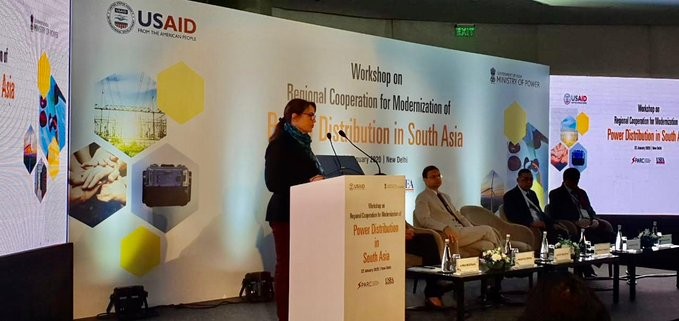India
- History
- Our Work
- Transforming Development Through Innovation & Partnership
- U.S.-India Triangular Cooperation
- Partnership for Energy Access and Security
- Partnership for Sustainable Forests in India
- Partnerships for Health
- Partnership for Education
- Partnership for Water Sanitation and Hygiene (WASH)
- Partnership for Food Security
- Partnership for Gender Equality
- Investing in Afghanistan
- Foreign Assistance Data
- Newsroom
- Newsletters and Fact Sheets
- Speeches
- Resources For Implementing Partners (RFIP)
- Careers
- Partnership Opportunities
- Success Stories
Press Release Shim
Speeches Shim

Senior power sector leaders from governments and utilities in South Asia converged in Delhi to deliberate on key priorities and modernizing utilities in the region.
For Immediate Release
New Delhi: To support the U.S. Government’s vision of a free and open Indo-Pacific region, the U.S. Agency for International Development (USAID) organized today a workshop on modernizing power distribution and the need to accelerate regional cooperation amongst power sector stakeholders in South Asia. Senior power sector leaders from governments and utilities in India, Nepal, Sri Lanka, Bhutan, and the Maldives took part in the dialogue.
Inequalities in power distribution infrastructure capabilities and lack of cooperation between utility professionals in the five countries has been one of the biggest roadblocks to an interconnected grid in the region. It is estimated that by 2040, Asia will account for two-thirds of the growth in global energy demand, most of which will come from South Asia. India alone is expected to account for 30 percent of this demand.
Speaking on the need to create a platform that will enable distribution utilities in South Asia to interact and share knowledge on a regular basis, Ramona El Hamzaoui, USAID Acting Mission Director to India, said: “Energy is a critical priority for our work in the Indo-Pacific region. Through the Asia Enhancing Development and Growth through Energy initiative (Asia EDGE), we are committed to working with Asian governments to find solutions to challenges faced by the power distribution utilities in the region.”
Sanjay Malhotra, Additional Secretary at the Indian Ministry of Power, said: “Bringing efficiencies to the power distribution sector is critical. Utilities in South Asia face the same legacy issues and there is a lot we can learn and leverage together as we work towards our common goal of modernizing the electric grid.”
Highlighting the need for new business models in power distribution, Saurabh Kumar, Managing Director at Energy Efficiency Services Ltd. (EESL), said: “EESL has been at the forefront of many large-scale deployment of energy initiatives such as smart meters and electric vehicles in India. We would be happy to share its learnings for the benefit of South Asia.”
A detailed case study on the setting up of 60 power charging stations for electric vehicles in Delhi by EESL—one of the largest public charging station programs in India—was also released at the workshop. USAID, through its Smart Power for Advancing Reliability and Connectivity (SPARC) program, supported EESL in the roll out.
Wasantha Prera, Secretary, Ministry of Power & Energy, Government of Sri Lanka said: “We need to modernize power distribution in South Asia. In this, Sri Lanka intend to go far...not just fast...therefore, let's walk together. We need to have our power sector utilities to be sociable, rich, delightful, chivalrous and long-lived as otherwise it can create an unmanageable giant as in Thomas Hobbes, a Leviathan. Therefore they have to be sociable, rich, delightful, chivalrous and long lived but not go solitary, poor, nasty, brutish or short.”
Ajwad Musthafa, Permanent Secretary, Ministry of Environment & Energy, Government of the Republic of Maldives said: “Maldives compared to other countries has a steeper learning curve in terms of the power sector. Interaction with peers in South Asian region will help us in addressing the key challenges and have a shorted deployment timeframe.”
USAID has a legacy of energy programs in South Asia, including those focused on distribution reforms and distribution utilities. Today’s workshop was jointly organized under USAID’s Smart Power for Advancing Reliability and Connectivity (SPARC) Program and the South Asia Regional Energy Hub.

Comment
Make a general inquiry or suggest an improvement.